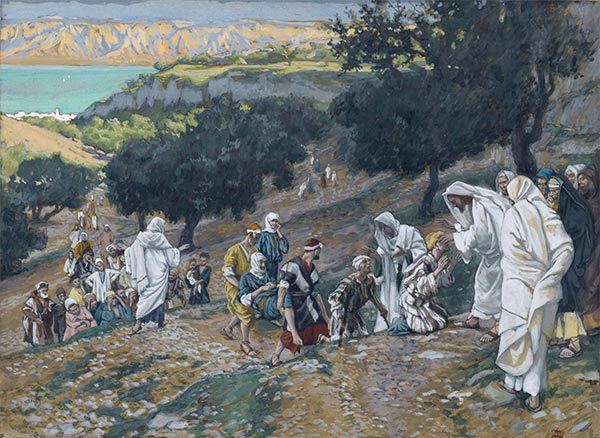Subtotal: $
Checkout
Many churches have recently taken steps to better include people with disabilities in all aspects of church life. For example, Pope Francis has insisted that all Catholics with disabilities have a right to receive the sacraments, and he recommends that parishes make efforts to welcome and train people with disabilities to serve as catechists. But full inclusion still evades the church. People with disabilities in local congregations attend church less frequently than those without a disability. People with intellectual disabilities who attend church services often do not participate in religious education classes or social activities. And parents of children with conditions such as autism are less likely to bring them to church.
All this should not surprise us. The challenge of spiritual inclusion for those with disabilities is nothing new. It existed at the time of Jesus. So, what did he teach about the exclusion or inclusion of people with disabilities? His parable of the great banquet is unequivocal:
A certain man gave a great supper and invited many, and sent his servant at supper time to say to those who were invited, “Come, for all things are now ready.” But they all with one accord began to make excuses. … Then the master of the house, being angry, said to his servant, “Go out quickly into the streets and lanes of the city, and bring in here the poor and the maimed and the lame and the blind.” (Luke 14:16–24)

James Tissot, Jesus Heals the Blind and Lame on the Mountain (Public domain)
To understand the importance of the inclusion of the maimed, the lame, and the blind in this parable, one must understand how these groups were treated in Judaism and the Greco-Roman world at the time. Distinctions for those with impairments are found in the Hebrew Bible as far back as the seventh century BC. Leviticus 21:16–23 identifies restrictions for priests with physical impairments: those who are lame, blind, disfigured, or deformed; those with a maimed foot or hand; a hunchback, a dwarf, and one that has an eye defect are all banned from making the offering to the Lord as a priest because it will profane the sanctuary. Other Middle Eastern cultures of the time had similar restrictions on the priesthood.
Some scholars speculate that the exclusion of people with disabilities was expanded by 2 Samuel 5:6–8: “The blind and the lame shall not come into the house.” It was the Greek translators of the Septuagint who took the Hebrew phrase which normally meant house and made it “House of the Lord.” We find further restrictions beyond the priesthood. The Mishnah restricts anyone with a physical impairment from appearing before the Lord. The blind, deaf mute, and lame are also excluded from appearing at the temple (Chagigah 1.1). Similar restrictions are also found in Dead Sea Scrolls at Qumran. In the Rule of the Congregation, restrictions pertain to persons with impairments in their feet or hands, the lame, the blind, the deaf, and those who are unable to speak. Persons in this category may not appear before the priests. They are not allowed in the council of holiness gatherings, and they cannot serve in leadership. Moreover, the physically impaired are not allowed to speak to the council about specific matters publicly (1 Sam. 2:3–10). The reason given for these exclusions is that “the holy angels are present in these gatherings.” In the Greco-Roman world, individuals with physical impairments primarily served as banquet entertainment and were not invited as guests to a banquet. Historical accounts indicate that individuals’ physical appearance was the subject of ridicule and verbal abuse during social gatherings (Cicero, De Oratore 2.58.238-9; Pliny, Natural History 34.6, 7.75; Suetonius, Augustus 43.3).
So when Jesus told the parable of the great banquet, the inclusion of the physically impaired would have shocked his listeners. If the master in the parable is God, then his holy presence would certainly dictate that the physically impaired were forbidden to join the banquet. Yet according to Jesus, the physically impaired had been invited.
Now those listening to Jesus’ parable had to reassess whether physical impairments were in fact a barrier to connection with God. There could be no mistake: Jesus offered the disabled invitations, deliberate inclusion at the feast, and full participation in the kingdom of God. Their physical condition did not determine God’s rejection or disapproval. Jesus had opened the kingdom to the physically impaired and welcomed them to the fellowship table.
Jesus is still telling the parable of the banquet. As listeners, we would do well to participate in the ongoing work of inclusion that Jesus advocated.
Brian Guy serves on the Pastoral Leadership Team at National Community Church. He lives in Washington, DC, with his wife, Cherilyn, and works for the federal government.
Already a subscriber? Sign in
Try 3 months of unlimited access. Start your FREE TRIAL today. Cancel anytime.






Bob Taylor
There is an excellent book about this which I recommend to all, "Why, O God? Suffering and Disability in the Bible and the Church," edited by Roy Zuck and Larry Waters.
Bill Dale
Yet Jesus could have and did heal some with disabilities. Why are some afflicted and others not? May all be free of suffering
Tony D’Orazio
In Matthew 25:40 Jesus makes it clear that we are to serve “the least of these brothers of mine”. Often times people with disabilities have fall into this catagory. /// see jacobsladderfitness.com